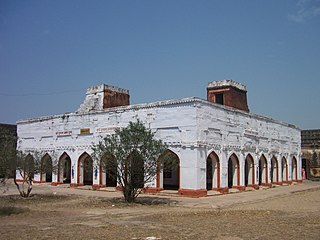 W
WThe term Alha Khand is used to refer to poetic works in Hindi which consists of a number of ballads describing the brave acts of two 12th century Banaphar heroes, Alha and Udal, generals working for king Paramardi-Deva (Parmal) of Mahoba against the attacker Prithviraj Chauhan of Delhi. The works has been entirely handed down by oral tradition and presently exists in many recensions, which differ from one another both in language and subject matter. The Bundeli, the Bagheli, the Awadhi, the Bhojpuri, Maithili and the Kannauji recensions are the most well known among these.
 W
WAndha Yug is a 1953 verse play written in Hindi, by renowned novelist, poet, and playwright Dharamvir Bharati (1926-1997). Set in the last day of the Great Mahabharat war, the five-act tragedy was written in the years following the 1947 partition of India atrocities, as allegory to its destruction of human lives and ethical values. It is a metaphoric meditation on the politics of violence and aggressive selfhood and that war dehumanized individuals and society. Thus both the victor and the vanquished lose eventually.
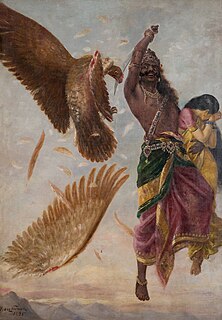 W
WAraṇya-Kāṇḍa or The forest episode is the third chapter of the epic poem Rāmcaritmānas written by Tulsidas.
 W
WArundhatī (1994) is a Hindi epic poem (Mahakavya) composed by Jagadguru Rambhadracharya (1950–) in the year 1994. It consists of 1279 verses in 15 cantos (sargas). The poem presents the narrative of the couple Arundhatī and Vasiṣṭha which is found in various Hindu scriptures. As per the poet, the narration of the epic is directly related to the psychological evolution of humans. A copy of the epic was published in 1994 by the Shri Raghav Sahitya Prakashan Nidhi, Haridwar, Uttar Pradesh. The book was released by the then President of India, Shankar Dayal Sharma on July 7, 1994.
 W
WAṣṭāvakra (2010) is a Hindi epic poem (Mahakavya) composed by Jagadguru Rambhadracharya (1950–) in the year 2009. It consists of 864 verses in 8 cantos (sargas) of 108 verses each. The poem presents the narrative of the Ṛṣi Aṣṭāvakra which is found in the Hindu scriptures of the Rāmāyaṇa and the Mahābhārata. A copy of the epic was published by the Jagadguru Rambhadracharya Handicapped University, Chitrakuta, Uttar Pradesh. The book was released on 14 January 2010, on the sixtieth birthday (Ṣaṣṭipūrti) of the poet.
 W
WGodaan is a famous Hindi novel by Munshi Premchand. It was first published in 1936 and is considered one of the greatest Hindi novels of modern Indian literature. Themed around the socio-economic deprivation as well as the exploitation of the village poor, the novel was the last complete novel of Premchand. It has been translated into English in 1957 by Jai Ratan and P. Lal as The Gift of a Cow. A 1968 translation by Gordon C. Roadarmel is now considered "a classic in itself".
 W
WHindiUSA, is a non-profit and entirely volunteer-managed organization in the United States. With more than 4000 members, it is one of the largest Hindi volunteer groups in America. HindiUSA has a total of 21 schools, with 15 in New Jersey, four in Connecticut, and one each in Maryland and Massachusetts. HindiUSA promotes Hindi language at the grassroots level by offering a broad spectrum of educational programs in the languages and cultures of India for students of all ages. The program features nine levels from Starter-1 to Graduation at Advanced-2. The curriculum consists of well-established programs in Hindi and is delivered via syllabus and books tailored for Indian-American children. Since its inception, the organization has strived to develop a sense of cultural pride in the students by familiarizing them to the Indian arts, customs, language, history, and keeping them abreast of current events. Adults volunteer on their own time to teach children of all ages about Hindi. The course is perfected for children of all age groups. A separate level is applied to each age group. This is comparable to the Chinese schools in America. The classes are held on Fridays. Annually, HindiUSA also hosts several large events such as Hindi festivals, where students from each class perform in various activities that promote the usage of Hindi language among the youth. Hindi poetry recitation competition called the Kavita Path Pratiyogita, is an example of such activities. Hindi Mahotsav is the largest Hindi annual event in North America organized by HindiUSA in late May or early June. This festival has also been recently broadcast on TV Asia.
 W
WKākā Vidura is a Hindi minor poem composed by Jagadguru Rambhadracharya (1950–) in the year 1980. It consists of 108 verses in Kavitta and Savaiya metres. The poem revolves around the characters of Vidura and his wife Sulabha from the Mahabharata.
 W
WKarmabhoomi is a Hindi novel by Munshi Premchand.
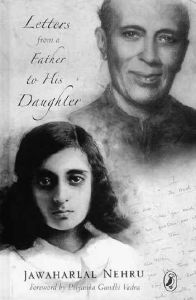 W
WLetters from a Father to His Daughter is a collection of letters written by Jawaharlal Nehru to his daughter Indira Priyadarshini, originally published in 1929 by Allahabad Law Journal Press at Nehru's request and consisting of only the 30 letters sent in the summer of 1928 when Indira was 10 years old. He arranged a second edition in 1931 and subsequently, further reprints and editions have been published with adapted titles, additional letters and prefaces and forewords by Indira Gandhi, Sonia Gandhi and Priyanka Gandhi Vadra.
 W
WNattal Sahu of Yoginipur is the earliest known Agrawal Jain merchant-prince, who lived during the reign Tomara king, Anangapal. His life's account is described in Apabhramsha text Pasanaha Cariu of poet Vibudh Shridhar, written in Vikrama Samvat 1189.
 W
WNirmala is a Hindi fiction novel written by Indian writer Munshi Premchand. The melodramatic novel is centered on Nirmala, a young girl who was forced to marry a widower of her father's age. The plot unfolds to reveal her husband’s suspicion of a relationship between her and his eldest son, a suspicion that leads to the son’s death.
 W
WPadmavat is an epic poem written in 1540 by Sufi poet Malik Muhammad Jayasi, who wrote it in the Hindustani language of Awadhi, and originally in the Persian Nastaʿlīq script. It is the oldest extant text among the important works in Awadhi. A famous piece of Sufi literature from the period, it relates an allegorical fictional story about the Delhi Sultan Alauddin Khalji's desire for the titular Padmavati, the Queen of Chittor. Alauddin Khalji and Padmavati's husband Ratan Sen are historical figures, whereas Padmavati is a fictional character.
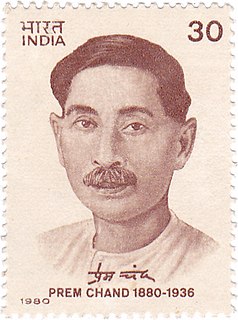 W
WDhanpat Rai Srivastava, better known by his pen name Munshi Premchand (pronounced [mʊnʃiː preːm t͡ʃənd̪] , was an Indian writer famous for his modern Hindustani literature. He is one of the most celebrated writers of the Indian subcontinent, and is regarded as one of the foremost Hindi writers of the early twentieth century. His novels include Godaan, Karmabhoomi, Gaban, Mansarovar, Idgah. He published his first collection of five short stories in 1907 in a book called Soz-e Watan.
 W
WThe Prithviraj Raso is a Brajbhasha epic poem about the life of the 12th century Indian king Prithviraj Chauhan. It is attributed to Chand Bardai, who according to the text, was a court poet of the king.
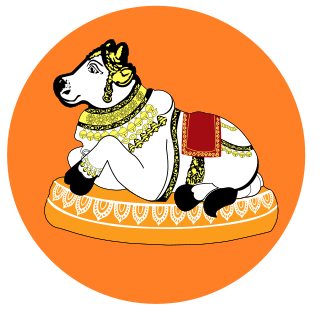 W
WShiv Chalisa is a devotional stotra dedicated to Hindu deity, Lord Shiva. Adapted from the Shiva Purana, it consists of 40 (Chalis) chaupais (verses) and recited daily or on special festivals like Maha Shivaratri by Shivaites, and worshippers of Shiva.
 W
WŚrīsītārāmakelikaumudī (2008), literally The moonlight (elucidation) for the [childhood] pastimes of Sītā and Rāma, is a minor poem in the Braja dialect of Hindi belonging to the Rītikāvya genre. It was composed by Jagadguru Rambhadracharya (1950–) in the years 2007 and 2008. The work is set in the backdrop of the Bālakāṇḍa of Vālmīki's Rāmāyaṇa and Tulasīdāsa's Rāmacaritamānasa, and is an assortment of verses describing the activities, pastimes and major events during the childhood of Sītā and Rāma. Śrīsītārāmakelikaumudī consists of 324 verses divided in three parts of 108 verses each. The verses are composed in seven Prakrit metres, namely Amātrika, Kavitta, Gīta, Ghanākṣarī, Caupaiyā, Drumila, and Mattagajendra.
 W
Wवसंत के हत्यारे is a short story collection by Hrishikesh Sulabh, comprising 9 stories in Hindi written over 10 years from 2003 to 2009. It has won the author the 16th Indu Sharma International Katha Samman given by Katha UK.